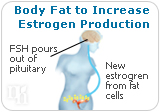Maintaining a healthy weight is a challenge for people of all ages. As we age, our ability to lose weight becomes increasingly difficult. In fact, weight gain is inevitable for 90% of women between the ages of 35 and 55. Not coincidentally, it's during these years that many women experience the onset of menopause.

Although nutrition, exercise, and lifestyle changes are critical elements to any weight loss program, balancing hormones is key to any successful weight loss challenge. Hormones and weight gain are closely related — imbalanced hormones can equal weight gain. This is especially apparent with too much cortisol or too little progesterone, testosterone, or estrogen in the body. Continue reading to find out how natural hormones affect weight during menopause.
Hormones and Weight Loss
Weight loss and hormones are also strongly connected. These hormone fluctuations, which often begin at the start perimenopause, can directly impact your appetite, fat stores, and metabolism. Hormones either help us lose weight or, oppositely, keep fat within our cells.
During menopause, hormones directly affect weight causing fluctuations in appetite, fat storage, and metabolism. The hormones that contribute to changes in weight are estrogen, progesterone, and testosterone.
Estrogen

Levels of this hormone decline during menopause which causes the ovaries to stop functioning entirely. This decreased production of estrogen causes the body's stores to seek out other estrogen sources like fat cells. The body learns to convert more calories into fat to increase estrogen production and this leads to weight gain.
Progesterone
It is common for progesterone levels to decrease during menopause. As women gain weight, low levels of the hormone do not actually cause you to gain weight, but it can cause water retention or bloating.
Testosterone

Building and maintaining muscle mass requires burning calories. Muscle cells work to burn calories creating a higher metabolism. Levels of testosterone decrease during menopause causing loss of muscle mass leading to a lower metabolism; this can lead to weight gain.
Stress can also contribute to weight gain during menopause. High amounts of stress put your body into “alert mode” preventing weight loss. This results in the body storing food since stress hormones, namely high cortisol levels, signal to the body that you will not be eating for a long period of time. This results in stored calories being converted to fat which leads to weight gain.
Losing weight is a gradual process that starts with understanding how hormones affect one's body. Click here to read more information about treatments using natural hormones.


